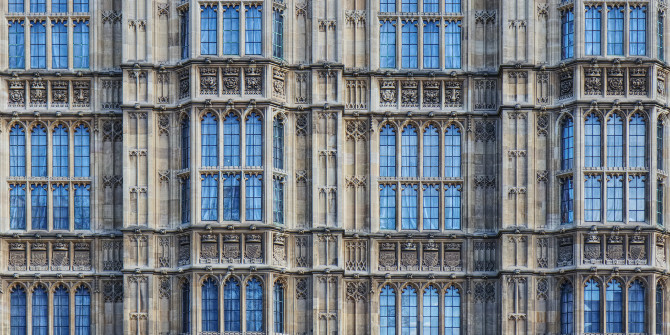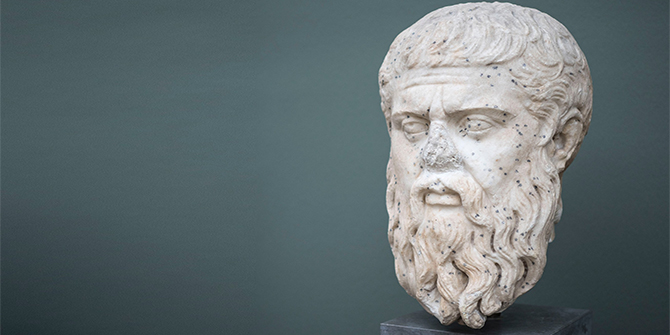 Why are young people attracted to socialism? In its efforts to disperse power and fear, liberalism generates its own power structures and pathologies, writes Lea Ypi, and these are destructive in their own right.
Why are young people attracted to socialism? In its efforts to disperse power and fear, liberalism generates its own power structures and pathologies, writes Lea Ypi, and these are destructive in their own right.
Google “millennial socialism” and you will find hundreds of articles, ranging from the perplexed to the alarmed, trying to make sense of why, as the most recent polls show, young people are attracted to an old idea: socialism. One answer is that they don’t actually know what it means. Another one, favoured by Donald Trump, is that they are “young, idealistic”. But if the words of Karl Marx are anything to go by, socialism is not an ideal to which reality adjusts itself. It is “the real movement that abolishes the present state of affairs”. “The conditions of this movement result from the premises now in existence”.
To explain why socialism is attractive, it pays to look at why liberalism is not. This is no easy task. Liberalism is a broad church. Liberalism is also not exactly the same as capitalism. Capitalism is a set of political and economic relations, liberalism is a set of ideas. While capitalism would not be capitalism without the support of liberal theories, not all liberal theories support capitalism. Progressive liberals, from John Stuart Mill to John Rawls have been critical of capitalism, indeed often defended alternative forms of social organisation like property-owning democracy and liberal socialism.
This puts liberalism in a curious position: to the extent that liberalism travels with capitalism, it is a historical phenomenon. To the extent that it departs from it or qualifies it, it is a social ideal. Liberalism has a core idea, freedom, and it has a core promise: freedom from fear. For progressive liberals the question is: should the failure of capitalism be considered a failure of liberalism? And if liberalism ought to be understood as an ideal rather than the reality under which we live, to what extent do the historical encounters between capitalism, socialism, fascism, democracy, theocracy, populism, condemn the liberal project as a whole?
To explain why socialism is on the rise, it is not enough to refer to the crisis of capitalism. We need to think about the failures of liberalism as a set of ideals. Liberalism cannot deliver freedom from fear because (even in its ideal form) it produces pathologies of its own, pathologies that are different from the fear of despotism or intolerance that liberalism opposes, yet destructive in their own right.
Socialists are fond of explaining liberal pathologies in connection to the material conditions in which ideas develop. But even before the socialist critique, the tensions of the project were clear to liberalism’s most acute observers. The intellectual origins of the project are in the religious wars of the 16th and 17th century and the combination of three elements: a moral anthropology, a theory of economics, and a theory of politics. All three helped liberal visionaries articulate a distinctive account of what power was and how it should be exercised; they contributed to the liberal utopia that we are still waiting to realise. Yet on all three counts, early critics of liberalism noted the tensions that made liberal promises no more than that.
Take the anthropology of liberalism. Many approved the liberation of individuals from the yoke of the authority and celebrated the emergence of a new ideal: that of civil society. This was based on role of “doux commerce” and the overall contribution of trade to material prosperity and peaceful relations between human beings. Yet the critiques of commercial society that circulated in the 18th century also listed all the destructive psychological dispositions that the liberal project encouraged: selfishness, greed, envy, distrust, competition for inessential and luxury goods, exaggeration of appearances, desire to impress, need for external recognition, rivalry, indifference to the fate of the most vulnerable, exploitative behaviour. As Rousseau observed, the birth of private property displaced communal feelings and escalated social inequalities. It led to a pattern of accumulation bringing the extreme enrichment of some at the expense of the extreme destitution of others.
Now take the relationship between economic theory and the theory of the state. As many early critics observed, while liberals celebrated commercial society, they needed the state to guarantee its functioning. Liberals credited themselves with the invention of human rights and the universal ideal of citizenship celebrated during the French and American revolutions. They also credited themselves with the end of corporate representation and the destruction of authority structures like the nobility and the church. But this universal ideal was constantly threatened by the conflict between the demands of commercial society and those of the state. On the one hand, the state is necessary to guarantee private property and the kinds of rights and obligations that enable commercial society to function. On the other hand, the state has very few revenues of its own, it discharges its basic functions by relying on the resources that markets allocate.
As authors like Hegel noticed, the state relies on taxation and the contribution that the rich make to its finances in order to preserve order and stability. But depending on the extent of taxation and of welfare measures necessary to ensure that inequality does not threaten stability, this can be so politically divisive as to destroy the universal ideal of civic solidarity. The old divisions of class and status return, only in modern form. Revolt is around the corner. To deal with the threat, the state outsources some of its problems to the international credit and debit system which is usually able to patch up domestic inequality at the price of global anarchy. As Kant observed, far from ending war, this cultivates rivalries of a different kind: commercial society expands outwards encouraging colonial exploitation and the plundering of global resources. Fichte, one of the most acute observers of this problem, ended up rejecting globalisation precisely on these grounds. His defence of “The closed commercial state” was an attempt to oppose the totalitarianism of the state to the totalitarianism of the market.
This leads to a third source of fear that is distinctive to liberalism. Classical liberals sought to limit the role of the state but celebrated civil society as a spontaneous, non-hierarchical structure where everyone is equal. This celebration of civil society was part of a stage-theory of history defended by many proto-liberals, including Adam Smith, Adam Ferguson and John Millar. For Smith and others, history is basically the history of material relations as articulated through different systems of production: hunter-gathering, pastoral, agricultural, and culminating in the superiority of commercial society.
Socialists are often criticised for endorsing teleological and progressive theories of history, but, as we can see, this was one of liberalism’s own making. Except, the liberal theories of history did not culminate in a utopia of politics but in a utopia of markets. They cultivated the hope that the global expansion of civil society would bring prosperity, unlimited technological improvement and material development.
Such a narrative of hope, together with the stage theories of history on which it is grounded is inherently hierarchical. The price of liberal hope in the triumph of civil society is the condemnation of alternative forms of life (e.g. the hunter-gathering and agricultural one) as inferior stages of historical development. This leads to the aggressive attack of people wedded to these forms of social organization as primitive, backward and in need of liberal re-education. Here too, liberalism produces its own distinctive fear, which is the fear of colonialism and empire. This is no collateral damage, no inconsistent application of liberal norms (say, in the form of advocating certain rights and liberties for people on one side of the world while denying them to others). It is a necessary component of the liberal mission to bring the virtues of civil society to people who are otherwise unable to realise them.
Liberals often brush aside the history of colonialism as if it had nothing to do with their ideals. But without the intrinsic connection between the utopia of commercial society and liberalism’s civilizing mission, we fail to understand why even progressive liberals like Mill and Tocqueville (who did not necessarily condone capitalism) are committed to exterminating barbarians. Their reasons are not accidental but essential to the liberal moral outlook. They are intrinsic to the realization of global commercial society and the structures and values that come with it. The fear of colonialism (and of neo-colonialism in the form of debt dependency or subservience to international institutions hegemonized by Western liberal countries or humanitarian intervention) is not an unfortunate byproduct of liberalism. It is the result of a theory of history in which liberal society is the final stage of a process that culminates in liberating backward people from their own stupidity and oppression.
All these elements speak to a more general question concerning the liberal understanding of freedom and its relationship to power. Liberals seek to limit the power of the state, of religious authorities, and any form of collective organisation that threatens individual freedom. But in its efforts to disperse power, liberalism generates its own distinctive power structures, its own set of fears and its own kind of unfreedom. Liberal power structures are anonymised rather than personal, they are spontaneous rather than planned, and the psychological attitudes that consolidate them breed selfishness and indifference rather than outright aggression.
But that does not mean that the fear of liberalism is any less concerning or any less pervasive than the fears that liberalism seeks to abolish. If anything, it may be more pernicious. Where power is dispersed, spontaneous and anonymised, it is even more difficult to fight. This may help to understand why millennials who care about freedom are looking for orientation in an alternative system not just of political and economic relations but also of moral ideals.
_______________
Note: a shorter version of this post was published in The New Statesman.
 Lea Ypi (@lea_ypi) is Professor of Political Theory at the London School of Economics and Political Science and co-author of The Meaning of Partisanship.
Lea Ypi (@lea_ypi) is Professor of Political Theory at the London School of Economics and Political Science and co-author of The Meaning of Partisanship.
All articles posted on this blog give the views of the author(s), and not the position of LSE British Politics and Policy, nor of the London School of Economics and Political Science. Featured image credit: Pixabay (Public Domain).








I am very much a lay observer of the political scene, and quite unlearned, so I have greatly hesitated before writing. But here are my comments, for what they are worth!
Professor Ypi’s argument (although it primarily concerns young people) is largely based, it seems to me, on the false premise that liberalism is everywhere in retreat. This is demonstrably not so, and France, surely, is a case in point. There, of course, Emmanuel Macron won the 2017 presidential election with his LREM movement. Its ideology is liberalism. As I am a social liberal, my political home is with the PRG (Radical Party of the Left), an admittedly very small party. As a leftist, I would have backed Benoit Hamon, the Socialist Party candidate, but he was trounced, receiving just 6.36% of the first round vote, compared with 24.01% for Macron – rising to 66.10% in the second round.
Professor Ypi holds that liberalism fails as a set of ideals because it produces pathologies and tensions – but which? It appears that her three sources of fear for liberalism are that (1) a market utopia is inherently hierarchical and condemns the inferior; (2) it escalates social inequalities and exploitation; and (3) this leads to colonialisation and empire. Is this understanding correct?
After identifying three elements to liberalism – moral, economic and political – Professor Ypi appears to dismiss its contribution with her reference to “the liberal utopia that we are still waiting to realise.” So much for the quite startling achievements (thanks to burgeoning trade and peaceful relations) in, for example, Canada and much of Europe over the years! Much that she condemns – selfishness, greed, indifference and exploitation – is (or was) frankly integral in “actually existing socialism”. And so the failure of capitalism cannot be taken as read.
I am not at all clear that the state, having guaranteed private property for civic society and enshrined welfare rights for civic solidarity, need be subject to divisions, as suggested, unless inequality is actively fostered by minimal taxation – not especially fruitful grounds on which to indict liberalism. A skilful social liberalism, open to the world, is, I suggest, enough to avoid both state and market totalitarianism.
If in civil society (idealised in liberalism) everyone is equal and it is spontaneous and non-hierarchical, how can it be that this necessarily clashes with a market society (utopian or otherwise), if the state is sufficiently modern and politically pro-active to make for a level playing field? This would be where progressive politics aids prosperity and material devrlopment, realising – in the absence, now, of colonisation and empire, along with their hugely questionable morality – the trueoasuperiority of commercial society.
Even though liberal society has been regarded as a final stage process, and notwithstanding the need for empathy, I think that fear of colonialism (unless through overbearing actions by institutions such as the IMF, which anyway appear to be diminishing) is now overdone. And the desire to liberate from ignorance and oppression is, surely, oa
This is a brief but succinct characterisation of the gradual but consistent growth of Socialism both as an intellectual principle and reality. The argument is balanced and the author has attempted, successfully, to stick to an objective assessment of both Capitalism and Socialism.
Great work.